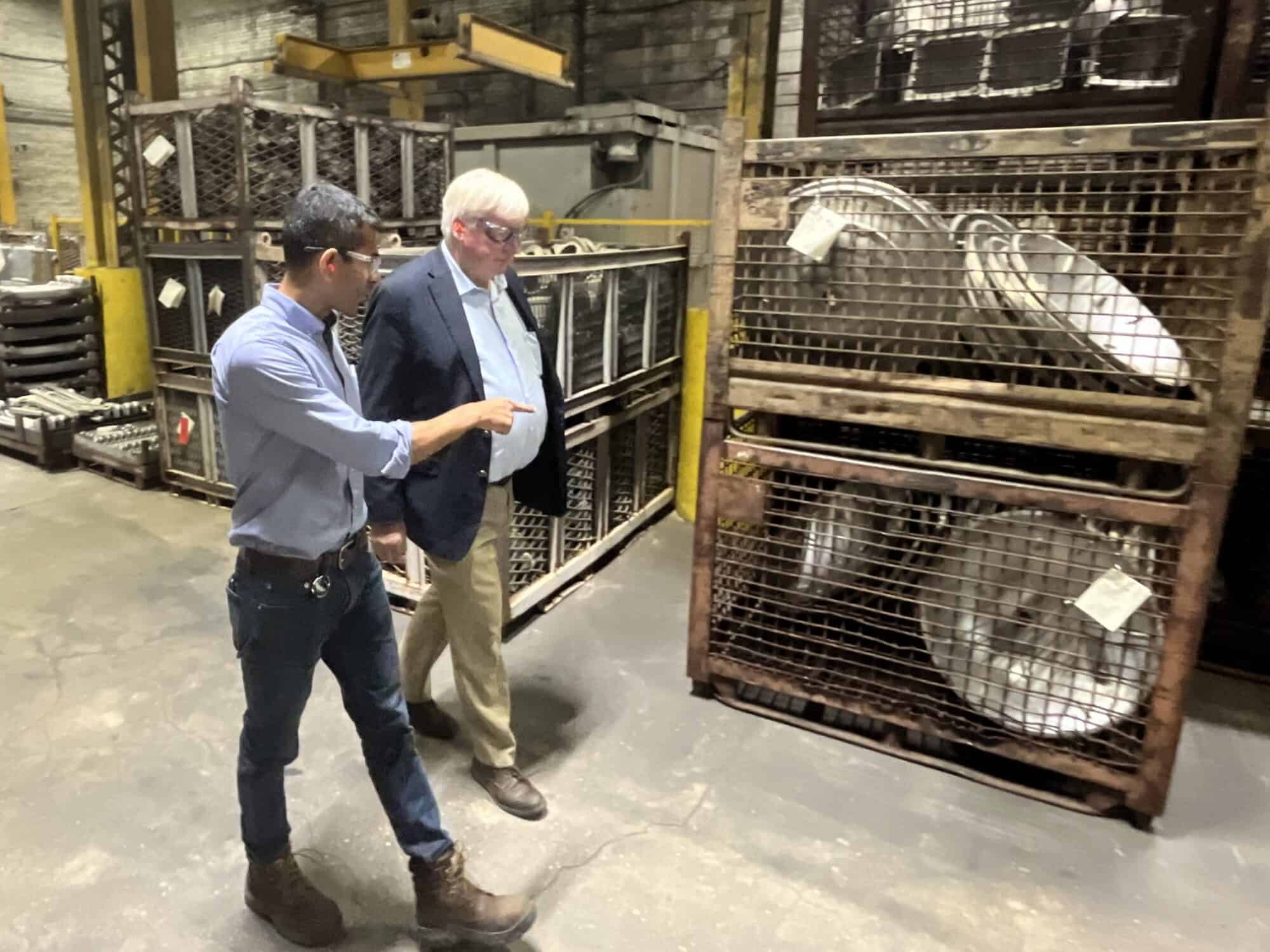Q&A: Rep. Morelle on Interest Deductibility

The NAM recently talked to Rep. Joe Morelle (D-NY) about what he and his congressional colleagues are doing to help manufacturers debt finance important projects. Below is the full text of the interview.
NAM: Rep. Morelle, Congress is facing a “Tax Armageddon” next year, as crucial pro-growth tax policies are set to expire at the end of 2025, and as you know, many have gone into effect already. What is your focus moving into next year’s debate?
Morelle: With provisions of the Tax Cuts and Jobs Act of 2017 set to expire, it is imperative that Congress acts to safeguard tax policies that support and strengthen American manufacturing. My focus remains on measures that enhance our economic resilience and competitiveness for families and small businesses alike. This commitment drives my introduction of the American Investment in Manufacturing Act, which aims to restore the deductible business interest cap to pre-2022 levels, encouraging vital domestic investment while mitigating the pressures of rising interest.
NAM: As you know, prior to 2022, businesses could deduct 30% of earnings before interest, tax, depreciation and amortization—a deduction standard known as EBITDA. A change in the tax code limits the deduction to only EBIT—excluding depreciation and amortization. This presents an added cost for businesses to take out loans to finance large capital investments in their facilities and equipment and disproportionately impacts the manufacturing sector. What are you doing to correct this policy?
Morelle: This year, I had the privilege of voting to advance the Tax Relief for American Families and Workers Act in the House of Representatives. This bipartisan legislation represents significant progress by expanding the Low-Income Housing Tax Credit, enhancing the Child Tax Credit and incorporating the AIM Act—my own legislative initiative to reinstate the EBITDA deduction standard. Reestablishing this deduction is essential to addressing the current tax code’s disproportionate burden on our manufacturing sector, which relies on loans for substantial investments in critical infrastructure and equipment. I remain committed to reintroducing the AIM Act in the upcoming Congress and to restoring the EBITDA deduction to ensure the continued strength of American manufacturing.
NAM: Correcting this policy would promote further domestic investment while helping address concerns about rising interest rates. As we get closer to next year, what are you hearing from stakeholders on the need for pro-growth tax policy so American businesses can engage and grow around the world?
Morelle: In today’s increasingly competitive global economy, American manufacturing is indispensable to expanding our workforce, enhancing competition and securing long-term economic growth. Unfortunately, the United States stands alone among OECD countries in applying an EBIT-based limitation, placing our industries at a competitive disadvantage. A return to the full EBITDA deduction would significantly enhance U.S. competitiveness and bolster economic prosperity. I am particularly proud that my district of Rochester, New York, was recently designated a Regional Innovation and Technology Hub by the Biden administration—a recognition that strengthens our community’s role in leading the manufacturing sector. As we approach the expiration of the TCJA, I am committed to championing pro-growth tax policies that uplift working families and drive innovation at both local and national levels.
NAM: Thank you, Rep. Morelle. Is there anything else you’d like to share with readers?
Morelle: As we prepare for the new Congress, I am committed to standing with American manufacturers and collaborating with NAM members to advance pro-growth solutions that drive our economy and support our shared vision.
Rep. Morelle Works to Reinstate Pro-Growth Interest Deductibility Standard

The year may be winding down, but Rep. Joe Morelle (D-NY) is only ramping up his efforts to reinstate a pro-growth tax provision that helps manufacturers debt finance job-creating projects.
What’s going on: As part of its “Manufacturing Wins” campaign, the NAM recently interviewed Rep. Morelle about what his congressional colleagues and he are doing to prevent “Tax Armageddon”—the end-of-2025 expiration of several important tax measures—and restore some vital, already expired tax provisions.
- Among the already expired provisions is tax reform’s standard for interest deductibility, which dictates how much interest on business loans manufacturers can write off. Tax reform capped companies’ interest deductions at 30% of their earnings before interest, tax, depreciation and amortization (EBITDA), but as of 2022, a more restrictive standard has been in place, based on companies’ earnings before interest and tax (EBIT).
What he’s doing about it: Rep. Morelle has introduced the American Investment in Manufacturing Act, “which aims to restore the deductible business interest cap to pre-2022 levels, encouraging vital domestic investment while mitigating the pressures of rising interest.”
- Rep. Morelle also noted that earlier this year he “had the privilege of voting to advance the Tax Relief for American Families and Workers Act in the House of Representatives,” bipartisan legislation that incorporates the AIM Act and would “reinstate the EBITDA deduction standard.”
Why it’s important: Rep. Morelle explained that the U.S. “stands alone among OECD countries in applying an EBIT-based limitation, placing our industries at a competitive disadvantage.”
- “A return to the full EBITDA deduction would significantly enhance U.S. competitiveness and bolster economic prosperity,” he said.
Manufacturing critical: Rep. Morelle is working to “safeguard tax policies that support and strengthen American manufacturing.” With respect to interest deductibility, Rep. Morelle said that reinstating an EBITDA-based standard “is essential to addressing the current tax code’s disproportionate burden on our manufacturing sector, which relies on loans for substantial investments in critical infrastructure and equipment.”
Read the full interview with Rep. Morelle here.
Interest Deductibility Explained

Congress allowed a pro-growth standard for interest deductibility to lapse in 2022—and manufacturers are already feeling the effects, according to a new NAM explainer.
What’s going on: Thanks to 2017 tax reform, from 2018 to 2021 manufacturers were allowed to deduct interest on business loans up to a cap of 30% of their earnings before interest, tax, depreciation and amortization (EBITDA). As of 2022, however, manufacturers’ interest deductions are capped at 30% of their earnings before interest and tax (EBIT).
- The result: a lower cap on how much interest companies can deduct, which means manufacturers effectively pay more to finance vital investments.
How it works: “The difference between a company’s EBITDA and EBIT are its depreciation and amortization expenses,” according to the explainer, part of the NAM’s “Manufacturing Wins” campaign.
- “Manufacturers make significant long-term investments in depreciable assets (such as equipment and machinery) and intangible assets subject to amortization (such as intellectual property), so these businesses experience a substantial delta between their EBITDA and EBIT—and thus face a much stricter interest deductibility limit under an EBIT-based standard.”
Why it’s a problem: The more stringent cap has a disproportionate impact on manufacturers, with 77% of the impact falling on manufacturing and related industries—limiting manufacturers’ ability to expand their businesses.
- Also, of the 35 countries with an earnings-based interest limitation, the U.S. is the only one that uses an EBIT-based standard, putting America at a competitive disadvantage in attracting new investment.
What we need: “Congress must act to restore a pro-growth, EBITDA-based interest deductibility standard,” said NAM Vice President of Domestic Policy Charles Crain. “Reversing the EBIT-based restriction will ensure that manufacturers can avoid increased financing costs and reduced liquidity—enabling capital investments throughout the industry.”
Manufacturers on 45X: Tax Credit Is Crucial to Building a Strong and Sustainable Domestic Advanced Manufacturing Supply Chain
Washington, D.C. – Following the release of guidance by the U.S. Department of the Treasury and the IRS for the Advanced Manufacturing Production Credit (Section 45X of the Internal Revenue Code), National Association of Manufacturers Managing Vice President of Policy Chris Netram released the following statement:
“Manufacturers welcome today’s announcement of final guidance on the 45X Advanced Manufacturing Production Credit and appreciate the administration’s willingness to make improvements that support manufacturing in the U.S. In particular, including critical mineral extraction and materials costs in the credit calculation will help bolster supply chain resiliency throughout the manufacturing sector. This tax credit will help manufacturers build a strong and sustainable domestic advanced manufacturing supply chain—from mining to processing to final product assembly.”
-NAM-
The National Association of Manufacturers is the largest manufacturing association in the United States, representing small and large manufacturers in every industrial sector and in all 50 states. Manufacturing employs nearly 13 million men and women, contributes $2.91 trillion to the U.S. economy annually and accounts for 53% of private-sector research and development. The NAM is the powerful voice of the manufacturing community and the leading advocate for a policy agenda that helps manufacturers compete in the global economy and create jobs across the United States. For more information about the NAM or to follow us on Twitter and Facebook, please visit www.nam.org.
Full Expensing: Q&A with Sen. James Lankford

The NAM recently talked to Sen. James Lankford (R-OK) to learn what he and his colleagues on the Senate Finance committee are focused on as critical provisions of the Tax Cuts and Jobs Act are set to expire next year. Here’s the full interview:
NAM: Senator Lankford, Congress is facing a “Tax Armageddon” next year, as crucial provisions from 2017’s Tax Cuts and Jobs Act are set to expire. As a member of the Senate Finance committee, what is your focus moving into next year’s debate?
Sen. Lankford: Extending the TCJA is crucial for American families and it creates certainty for businesses, particularly those policies encouraging investment and innovation. Failure to act will result in a tax increase for most American households and 96% of businesses. For greater predictability, Congress should push for as many permanent pro-growth policies as possible. One such policy is the full expensing of new investments, which allows businesses to deduct the cost of machinery and equipment in the year they are purchased. This measure has significantly incentivized capital investment, leading to job creation and economic expansion.
NAM: The 2017 tax reform package implemented full expensing for capital equipment purchases, which manufacturers overwhelmingly utilized in the years following. However, full expensing began to phase out in 2023 and will be completely eliminated from the tax code in 2027. What are you doing to protect this crucial policy?
Sen. Lankford: For the past 20 years, under Republican and Democratic administrations, bonus depreciation has been an essential element of good business tax policy. Bonus depreciation acknowledges that business expenses are not business profits, so they should not be taxed as profits. The 2017 tax bill expanded on that nonpartisan tax policy by allowing businesses to depreciate 100% of their capital and equipment during the purchase year, instead of over years and years of tax returns. That change doesn’t alter how much tax a business can deduct; it simply changes when they can deduct it. With 100% depreciation, a business can deduct its tax in a single year, instead of over several years. That allows a business to invest more capital, hire new employees faster and expand their business. My ALIGN Act will make bonus depreciation a permanent and predictable tax policy for our businesses and manufacturers, and it will encourage economic growth for decades to come.
NAM: As a Senator who was there during the Tax Cuts and Jobs Act, you know how impactful the legislation was for manufacturers to be able to compete on a global level. As we get closer to next year, what are you hearing from stakeholders on the need for pro-growth tax policy so American businesses can engage and grow around the world?
Sen. Lankford: I have connected with Oklahoma businesses—both large and small—to discuss tax policies that affect them and how we can ensure our tax system provides certainty while keeping the U.S. competitive internationally. We must not lose sight of how a competitive tax code drives American investment, which, in turn, strengthens our economic and national security. The TCJA struck a competitive balance with a 21% corporate tax rate and a 20% rate for pass-through businesses.
Some are calling for an increase in the corporate rate to 28%. However, the average corporate tax rate in the EU is 21.3%, with a global average of 23% across 181 jurisdictions. China has a corporate tax rate of 25%, with a reduced 15% rate for new sectors. Moreover, China has significantly expanded its R&D deduction, while the U.S. is shrinking ours. We should reverse the decline of our R&D deduction and permanently encourage businesses of all sizes to remain innovative here in America.
As the Senator from Oklahoma, I’m keenly aware of the connection between a competitive tax code and energy security. As we work to strengthen our national security, now is not the time to target American oil and gas producers. Looking ahead to 2025, I will fight to protect the current treatment of intangible drilling costs (IDCs) in the tax code. IDCs allow oil and natural gas companies to recover these costs more quickly, freeing up funds for reinvestment in development. This not only creates more jobs but also enhances our energy security and keeps energy prices low for American families.
NAM: Thank you, Senator. What else can NAM members do to stay engaged and be a resource for you going into next year?
Sen. Lankford: I encourage everyone to regularly communicate with their congressional delegation about the impacts a lapse in the TCJA would have on their businesses and communities. For example, full expensing drives investments in sectors ranging from rural broadband and agriculture to energy security and manufacturing. These investments directly boost local economic output, create jobs, and enhance the competitiveness of communities in the market. It’s important to share this story as Congress works on a tax bill in 2025.
Rep. Grothman Talks R&D, Taxes at Wisconsin Aluminum Foundry

Rep. Glenn Grothman (R-WI) visited Wisconsin Aluminum Foundry in Manitowoc, Wisconsin, as part of a series of facility visits from key members of Congress organized by the NAM. Rep. Grothman, representing a district with one of the largest percentages of its workforce employed in manufacturing, emphasized the importance of key tax policies that keep manufacturers competitive on a global scale.
During the visit, Rep. Grothman toured the facility with Wisconsin Aluminum Foundry CEO Sachin Shivaram and held a roundtable discussion with company and union leadership. Representatives from Wisconsin Manufacturers & Commerce also participated in discussions about the challenges facing manufacturers.
Innovation and R&D: Shivaram showcased the Foundry’s advanced aluminum and bronze casting capabilities during the tour. He also expressed concern about changes in R&D tax treatment, which have increased the cost of innovation.
- “R&D is essential to the future of our business,” said Shivaram, stressing that restoring full R&D expensing is crucial for manufacturers like Wisconsin Aluminum Foundry. With the expiration of first-year R&D expensing in 2022, the burden of financing R&D has become a major obstacle for small and medium-sized manufacturers.
- Rep. Grothman, who strongly supports restoring full R&D expensing, said, “Manufacturers need every incentive to innovate and grow. If we want to maintain our competitive edge, we need to ensure that tax policy encourages, not discourages, investment in R&D.”
Preserving tax reforms: The roundtable addressed the importance of preserving the 2017 Tax Cuts and Jobs Act, which benefited manufacturers by lowering the corporate tax rate and providing a 20% pass-through deduction for small businesses. These provisions are set to expire in 2025, creating uncertainty for manufacturers.
- Rep. Grothman pointed to Wisconsin’s manufacturing and agriculture credit as a model for federal tax policy going forward. The MAC, which substantially reduces state taxes on manufacturing income, has proven effective in supporting Wisconsin’s manufacturers.
- “We should look at expanding these kinds of targeted incentives nationwide,” Rep. Grothman said, noting that a similar approach at the federal level could bolster U.S. manufacturing and global competitiveness.
The local view: WMC President and CEO Kurt Bauer echoed the concerns about the expiration of the 2017 tax reforms.
- “If these tax provisions are allowed to expire, it would put significant strain on Wisconsin’s manufacturers,” Bauer said. “The ability to reinvest in equipment, innovation and workers is crucial for maintaining our global competitiveness, and losing these tax incentives would make that much harder.”
Workforce development: The roundtable also covered workforce development, a critical issue for an industry facing a shortage of skilled workers.
- Shivaram, who chairs the Governor’s Council on Workforce Investment, stressed the importance of expanding access to skills-based education and apprenticeship programs to meet the needs of modern manufacturing. “We need policies that help us train and retain the workforce of the future,” he said.
- Rep. Grothman echoed this sentiment, pledging to support federal workforce development initiatives that prepare workers for careers in advanced manufacturing. “A skilled labor force is the foundation of manufacturing’s future,” he said.
Closing thoughts: “It is critical that tax policy continue to support manufacturers, who are the backbone of our economy,” said Rep. Grothman. “If we allow tax reform to expire, it would result in devastating tax increases—stalling job creation and innovation. It’s on us in Congress to work together to preserve tax reform and encourage investment, protect jobs and keep American manufacturers competitive on the global stage.”
Fighting for a Competitive Future: A Conversation with Sen. James Lankford

As Congress faces the looming expiration of key provisions from the 2017 Tax Cuts and Jobs Act, Sen. James Lankford (R-OK) emphasizes the urgency of extending these policies to safeguard American businesses and families from tax increases.
Ensuring certainty: Sen. Lankford underscored the importance of creating predictability for businesses by making pro-growth policies permanent. “Extending the TCJA is crucial for American families, and it creates certainty for businesses, particularly those policies encouraging investment and innovation,” he told the NAM in a recent conversation. “Failure to act will result in a tax increase for most American households and 96% of businesses. For greater predictability, Congress should push for as many permanent pro-growth policies as possible.”
One policy Sen. Lankford is particularly focused on preserving is full expensing for capital investments, which allows businesses to immediately deduct the cost of machinery and equipment. This measure, he said, has fueled capital investment and accelerated job creation.
Protecting full expensing with the ALIGN Act: Full expensing has been a bipartisan tool in tax policy for two decades, Sen. Lankford points out, highlighting that the TCJA allowed businesses to deduct 100% of capital expenses in the year of purchase. His ALIGN Act aims to make full expensing a permanent fixture in the tax code, fostering long-term economic growth.
- “That change doesn’t alter how much tax a business can deduct; it simply changes when they can deduct it. With 100% depreciation, a business can deduct its tax in a single year, instead of over several years. That allows a business to invest more capital, hire new employees faster and expand their business.”
Global competitiveness and energy security: Drawing from conversations with Oklahoma businesses, Sen. Lankford stressed that keeping the U.S. tax code competitive is critical. While some push for a corporate tax increase, he warned this would undermine America’s global position.
- “The average corporate tax rate in the EU is 21.3%, with a global average of 23% across 181 jurisdictions. China has a corporate tax rate of 25%, with a reduced 15% rate for new sectors. Moreover, China has significantly expanded its R&D deduction, while the U.S. is shrinking ours. We should reverse the decline of our R&D deduction and permanently encourage businesses of all sizes to remain innovative here in America.”
The final word: “I encourage everyone to regularly communicate with their congressional delegation about the impacts a lapse in the TCJA would have on their businesses and communities,” Sen. Lankford said. “It’s important to share this story as Congress works on a tax bill in 2025.”
Read the full interview with Sen. Lankford here.
Small Manufacturers: Congress Must Restore Full Expensing

As part of the NAM’s “Manufacturing Wins” tax campaign, small and medium-sized manufacturers are urging Congress to make full expensing of capital equipment purchases permanent, warning that the phaseout of this pro-growth tax provision is harming their ability to invest, grow and compete.
What’s happening: Tax reform allowed manufacturers to immediately expense 100% of the cost of capital equipment purchases. But this provision started to be phased out in 2023, dropping by 20%. It will drop by a further 20% every year until 2027, when it will expire completely.
- Seventy-eight percent of manufacturers said that the expiration of full expensing and other pro-growth tax provisions has decreased their ability to expand U.S. manufacturing activity, according to an NAM Manufacturers’ Outlook Survey from last year.
What’s at stake for manufacturers: Capital-intensive industries like manufacturing are the primary beneficiaries of full expensing.
- Lori Miles-Olund, president of Miles Fiberglass & Composites in Clackamas, Oregon, explained the benefits for her company: “We were able to purchase new equipment that not only made our production more environmentally friendly but also safer and more efficient for employees.”
- Colin Murphy, president and owner of Simmons Knife & Saw in Glendale Heights, Illinois, emphasized how critical full expensing is for global competitiveness: “To remain competitive, we need to continually innovate and consistently invest in new machinery and equipment. But with rising tax bills, it’s becoming harder to do so.”
Delayed investments: Some manufacturers are holding off on equipment purchases due to the uncertain tax landscape.
- “I know exactly where the next capital investment should be installed, but I’ve been delaying this decision,” said Courtney Silver, president and owner of Ketchie in Concord, North Carolina. “[Full expensing] dropped to 60% [in 2024], and the fact that I can’t expense the full value of this investment changes the return on investment calculation.”
- In Hodgkins, Illinois, Pioneer Service recently moved from a 24,000-square-foot building to a 62,000-square-foot building, but it can’t take advantage of all this space without full capital equipment expensing. “We had 13 more machines on order that we’ve put a hold on,” explained CEO and Co-Owner Aneesa Muthana. “Thirteen machines equivalent to about $5 million in capital, and that’s completely on hold until we know what’s going to happen next.”
Calling on Congress: If Congress does not act, accelerated depreciation will be entirely absent from the U.S. tax code for the first time in decades. “This isn’t just about numbers on my financial statements and my tax returns—this is about taking care of people here and in communities across this country working for small manufacturers,” said Silver.
- “Congress must act now to support American manufacturers,” said Murphy. “Our ability to invest in our communities, create jobs and innovate is at risk.”
Small Manufacturers Sound the Alarm on Uncompetitive R&D Tax Policy

As part of its “Manufacturing Wins” tax campaign, the NAM’s small and medium-sized manufacturers are drawing lawmakers’ attention to R&D amortization, an uncompetitive tax policy that’s killing jobs and dragging down the world’s most innovative economy.
The problem: “Allowing companies like Sukup Manufacturing to immediately expense R&D investments had been part of the tax code for more than 70 years,” explained Steve Sukup, president and CEO of the Sheffield, Iowa–based company. “But since 2022, we have had to amortize our R&D expenses over five years.”
- “This affects manufacturers everywhere and has a dramatic impact on the U.S. economy, as the private sector accounts for more than 75% of total R&D spending—with small businesses accounting for approximately $90 billion of all private-sector R&D investments.”
- Another heavily impacted manufacturer is Husco of Waukesha, Wisconsin. “In 2024, we have $20 million less liquidity than we would have under the old R&D expensing rules,” said Husco President and CEO Austin Ramirez. “That $20 million represents almost our entire capital budget for 2024.”
Threatening jobs: “Limiting R&D doesn’t just limit innovation—it also has a direct impact on people’s jobs here,” said Tom Tredway, president of Erie Molded Packaging in Pennsylvania. “And these are quality, high-paying jobs—but they are at risk if immediate R&D expensing isn’t restored.”
- “Bringing a new medical device to market is a multiyear process, necessitating significant investments in R&D,” explained Chuck Wetherington, president of BTE Technologies in Hanover, Maryland. “Being required to amortize our R&D expenses has forced us to staff our technical team at a reduced level, slowing down the development of new products.”
Handing a win to China: “China allows a ‘super deduction’ for manufacturing R&D equal to 200% of research costs. That is what we are up against,” said Lisa Winton, who co-founded Winton Machine Company in Suwanee, Georgia. “Meanwhile, Belgium is the only other developed nation with an amortization requirement like the United States.”
- “When you look at the generosity of foreign support, especially China’s, versus the United States, it’s so lopsided,” said Daryl Bouwkamp, who serves as Vermeer Corporation’s senior director of international business development and government affairs. “China is trying to drive behavior toward R&D—and that’s something we’re lacking.”
- “Suddenly, China started manufacturing bagel baskets and shipping them to New York City for cheaper than I could get the steel,” recalled Drew Greenblatt, president and owner of Marlin Steel Wire Products. “We realized we couldn’t thrive in a commodities market. … We [need] to be able to say to buyers, ‘You must buy from the American innovative company because we’re coming up with such slick ideas that our product blows the competition away.’”
Innovation at risk: “[Now is the time] we most need to make investments in innovation, both around the technologies that we provide in our products enabling the United States’ economic growth and success [and] the technologies we use to produce the products that we make,” said Karl Hutter, CEO of Click Bond in Carson City, Nevada.
- Patricia Miller of M4 Factory in Woodstock, Illinois, highlighted that manufacturers are key to meeting the world’s most intractable challenges: “We need to keep those [companies] that are driving the future of innovation and manufacturing in the U.S. economically viable and competitive.”
The last word: “Congress not allowing manufacturers to immediately expense R&D expenses directly translates to fewer quality jobs in the manufacturing sector while our foreign competitors are implementing vastly more beneficial R&D benefits,” Tredway concluded.
R&D Expensing: Q&A with Sen. Young

The NAM recently talked to Sen. Todd Young (R-IN) about the importance of reinstating immediate expensing for research-and-development expenditures. Here’s the full interview:
NAM: Sen. Young, Congress is facing a “Tax Armageddon” next year, as crucial provisions from 2017’s Tax Cuts and Jobs Act are set to expire. As a member of the Senate Finance Committee, what is your focus moving into next year’s debate?
Sen. Young: The Tax Cuts and Jobs Act was a great success—millions of Americans, especially those in the middle class—saw their taxes go down. Corporate tax receipts went up. We stemmed the tide of corporate inversions, and many companies chose to return their operations and tax bases to the United States. If Congress does not act next year to extend provisions of the TCJA, we will undo all of these victories and inflict long-lasting damage on our economy. As we prepare for next year, I am focused on evaluating how best we can build upon our TCJA successes and continue to adopt pro-growth, fiscally responsible tax policy that helps hardworking Americans thrive.
NAM: As you know, for nearly 70 years, manufacturers in the U.S. were able to fully deduct their R&D expenses in the year incurred. Beginning in 2022, however, manufacturers were forced to spread their deductions over several years, greatly harming our ability to grow and compete. What is Congress doing to restore immediate R&D expensing?
Sen. Young: For several years now, I have advocated for the American Innovation and Jobs Act (S. 866), my bill with Sen. Maggie Hassan (D-NH) that would restore full and immediate expensing of R&D expenditures. We first introduced the bill back in 2020 well before the provision expired, and I am disappointed that we are now reaching the end of 2024—nearly three years after the law shifted to amortization of R&D investments—and Congress has yet to pass our bill to fix this crucial issue. As our global competitors, like China, are expanding their R&D incentives, we simply cannot allow our nation and our economy to be left behind. Congress must work to restore our R&D incentives as soon as possible, and this will be one of my top priorities heading into next year’s tax negotiations.
NAM: As a senator who was there during the Tax Cuts and Jobs Act, you know how impactful the legislation was for manufacturers to be able to compete on a global level. As we get closer to next year, what are you hearing from stakeholders on the need for pro-growth tax policy so American businesses can engage and grow around the world?
Sen. Young: At the risk of oversimplifying the issue, it really comes down to competitiveness. A lot of the work I have done in the tax space as well as in other areas is focused on ensuring that America’s position as a global leader remains strong. Without growth, our economy suffers and our ability to remain internationally competitive is diminished. This is a massive national security risk. So, as I look ahead to what next year may hold in the tax arena, I am focused on pro-growth tax policy. We need to be thinking creatively about ways we can add value to our economy and, in turn, ensure Americans are better off.
In different industries this takes on different forms; however, one common thread is the need for R&D. To grow and develop new products, businesses have to put significant amounts of capital into R&D costs, both domestically and internationally. That is why one of my core areas of focus continues to be restoring full and immediate expensing of R&D costs. It is vital for the health of our economy that we take this action, which allows safer and more innovative products to be brought to the marketplace; increases the number of [well]-paying, high-skilled jobs; and secures U.S. interests abroad by ensuring we remain globally competitive.
NAM: Thank you, Sen. Young. What else can NAM members do to stay engaged and be a resource for you going into next year?
Sen. Young: I have always appreciated the NAM’s partnership and advocacy as we work together on these important issues. I would encourage NAM members to continue sharing stories with their elected federal officials of the importance of these tax incentives, like R&D, that enable the creation of high-quality jobs, promote our national competitiveness and strengthen our economy. Your voice matters.
